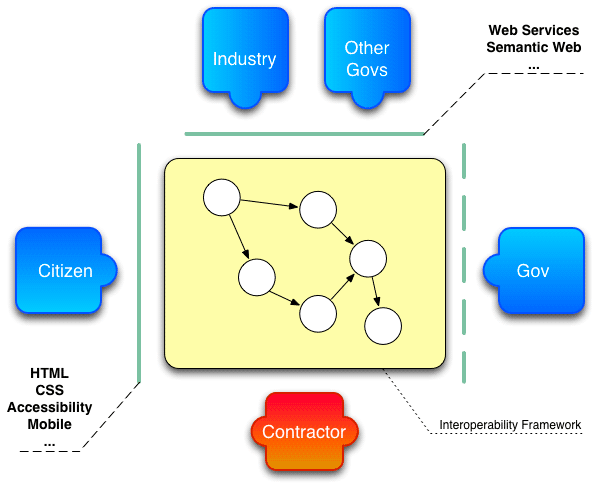eGovernment at W3C
Improving access to government through better use of the Web
- Public Interest Group:
forum for discussion
- Collective effort: Governments, Industry, Citizens, Civil Societies,
other International Bodies
- Identification and description of existing challenges and propose ways to
address them
- Three Task Forces: Usage of Web Standards, Transparency and Participation
and Seamless Integration of Data
- Outcome:
- Creation of an interdisciplinary forum
- Identification and documentation of challenges and propose
good practices to tackle them (Group Notes)
Open Standards: Big Picture

This talk
- Open Standards
- Participation
- Transparency
- Data Integration
What Open Standard means for W3C?
- Transparent process
- Open participation
- Technical Consensus
- Running code
- Free and Persistent Specification
- Longevity of information
- W3C Patent Policy for Web
Technologies

Open Standards
- Governments should not require people to purchase particular software to
access information
- Promote longevity of information, persistence
- Accessibility
- WCAG 2.0 is coming (already in PR)
- Openness helps to maximize reuse of knowledge
- colleagues, departments, agencies, citizens, companies, other
governments, other partners
- Key: suite of open standards
- what’s the best way to enable a given policy goal?
Participation
- Demand raises but usage still low
- Discoverability of services
- one-stop shop vs. "Google as authoritative source"
- Collaborative tools and sites
- Risk management
- Creation of policies
- Engage in conversation

Transparency
- Accessibility of Information
- Open Government Data
- obscurity by default, granularity
- let people mash it up! (more later)
- Identify provenance of information
- DRM, IPR
- Build trust

Data Integration: the road ahead
- HTML Scrapping
- RSS/Atom
- API
- RDFa
- XML
- Semantic Web
Considering benefits?
- examples:
- reducing the cost of road excavations
- services that require eID
- services affected by law passed by Congress yesterday
(more at the workshop)
Removing the "e" from eGovernment
- Online services not just an alternative
- Becoming “the” public services
- Majority of apps now only use Web interfaces
- More important than ever to solve problems
- join the Group; send Use Cases





